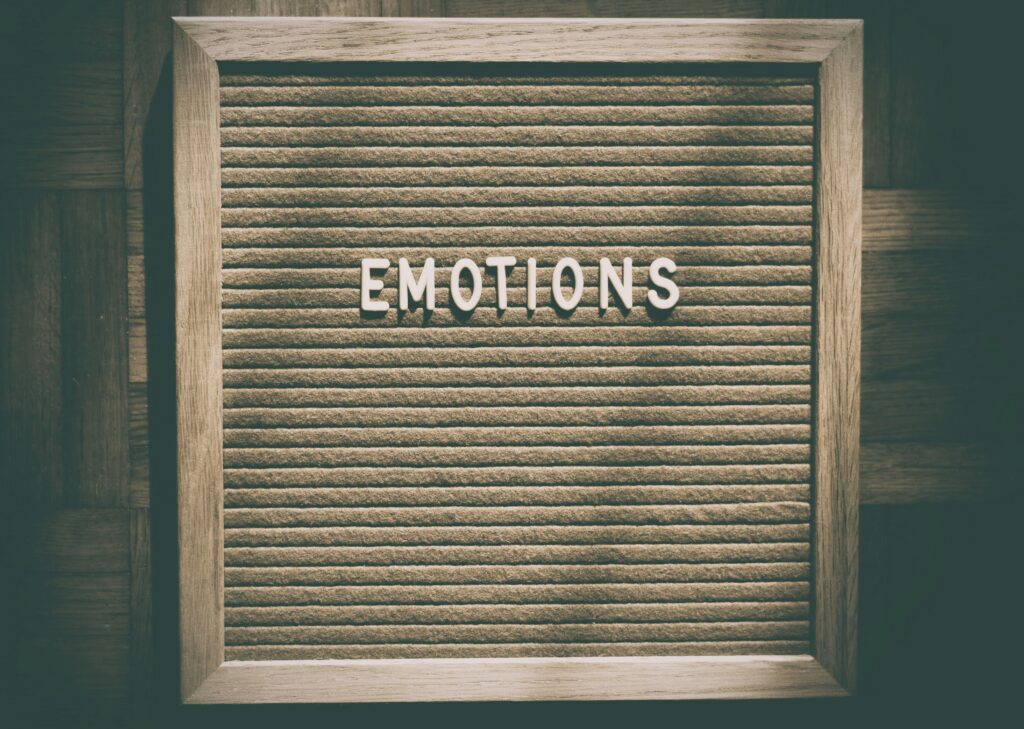x min read

“Emotions” Images – Unsplash.com
Introduction
This just happened to me yesterday, so I’m speaking from experience. That thing that happened to me was incredibly terrible focus, as a result of my emotions.
In this post, we’ll define emotions and explain the role it plays on how you focus and intake information. Hint: it’s bad.
Emotions: Defined
Emotions is something that lives in every one of us. No matter how “strong” you are, or how “strong” society has conditioned you to be, all of us are still vulnerable to emotional situations. Every. Single. One of us. The only difference is that some of us are better at handling emotions than others.
As defined by Oxford Languages, emotions is:
“a natural instinctive state of mind deriving from one’s circumstances, mood, or relationships with others.”
Oxford Languages
All of us can be angry, sad, scared, and happy. However, very few of us are able to control our emotions, and relax ourselves in stressful situations.
The Role Emotions Have On Your Focus
According to the National Library of Medicine of the United States (NIH),
“Emotion has a substantial influence on the cognitive processes in humans, including perception, attention, learning, memory, reasoning, and problem solving.”
National Library of Medicine
Think about a day when you woke up feeling great, the sun was shining, and everything seemed to go your way. On days like that, sitting down to work on a project or study feels almost effortless. You’re in the zone, ideas flow easily, and before you know it, you’ve gotten a ton of work done. That’s the power of positive emotions boosting your focus. It’s like when you’re happy, your brain is on your side, making it easier to dive into tasks and stick with them. You might even find yourself tackling problems from new angles or coming up with creative solutions you wouldn’t have thought of on a less upbeat day.
Now, let’s flip the script and think about a day when everything seems to go wrong from the moment you get out of bed. Maybe you didn’t sleep well, you’re worried about something, or you’re just feeling off. Trying to get work done on days like that can feel like walking through mud. Your mind keeps wandering, especially to whatever’s bothering you, making it super hard to focus on the task at hand. It’s like your brain has turned into a TV stuck on a channel you don’t want to watch, and you can’t find the remote. Negative emotions have a knack for hogging all your mental energy, leaving little for the things you actually need to do.
How It Works
The thing is, our brains are wired to pay attention to how we feel. Emotions are like signals that tell us to pay attention to something, whether it’s good or bad. When we’re happy, our brain says, “This is great! Let’s keep going!” But when we’re stressed or upset, it’s like an alarm bell ringing, telling us, “Warning! Problem ahead!” That alarm can be useful, but it can also make it hard to focus on anything else.
In my experience, whenever I was having an off-day, wasn’t feeling my best, and was feeling down, focusing on anything productive was unbelievably difficult. You know that feeling that we get whenever we try working whenever we’re extremely tired and just out of it? That’s exactly how it feels to work with negative emotions. The brain would much rather focus and prioritize other things than having to do work. It keeps throwing you with negative and bad material constantly that just makes you feel bad about yourself. It throws rocks and stones at you, and your only option is to duck and run, because your concentration is in the gutter.
What It Means To “Manage Emotions”
So, managing emotions isn’t just about feeling better; it’s also key to being more focused and productive. Simple things like taking breaks, chatting with a friend, or going for a walk can help shift your mood and improve your focus. It’s all about finding balance, knowing that how you feel plays a big role in how well you can concentrate and get things done.
In short, emotions and focus are closely linked. By understanding and taking care of our emotional well-being, we can not only feel better but also boost our ability to concentrate and be more effective in whatever we set out to do.

“Grasping Your Emotions Will Change Everything”
How To Manage Your Emotions
Managing emotions is a bit like learning to ride the waves in the ocean. It starts with recognizing that emotions, like waves, are a natural part of life—they come and go. The first step is to become more aware of your feelings, noticing what triggers them and how they affect your thoughts and actions. This awareness can be like a beacon, guiding you through rough emotional waters.
Imagine you’re sitting on the shore, watching the waves (your emotions) roll in. Instead of trying to stop them or run away, you learn to sit with them, understand them, and respect their power. This could mean taking a moment to breathe deeply when you’re feeling overwhelmed, giving yourself permission to feel without judgment.
Communication plays a big role too. Just like sharing stories around a campfire, sharing your feelings with trusted friends or family can lighten your emotional load. They don’t necessarily have to fix anything; sometimes, just being heard is enough.
And don’t forget, taking care of your body is like taking care of your surfboard; it makes riding the waves easier. Regular exercise, enough sleep, and eating well can make a big difference in how you handle emotional ups and downs.
Remember…
Just like surfing, managing emotions takes practice, patience, and sometimes, a bit of courage. But over time, you’ll find yourself navigating those waves with more grace and confidence.
How To Boost Your Mood
Boosting your mood quickly is like flipping a switch inside you to light up a dark room. It starts with doing something small but impactful. Imagine putting on your favorite upbeat song, the kind that makes you want to dance or just tap your foot. Music has a magical way of shifting our energy and outlook almost instantly. Or picture yourself stepping outside, taking a deep breath of fresh air, and feeling the sunlight on your face.
Nature has its own way of resetting our mood, reminding us of the beauty and simplicity around us. Engaging in a brief moment of laughter, whether it’s from watching a funny video or recalling a hilarious memory, can also act like a quick mood elevator, sending a ripple of positive vibes through your body. It’s about finding those little sparks of joy and letting them light up your mood from the inside out. Remember, sometimes the quickest way to boost your mood is to acknowledge it needs a lift and then taking even the smallest step to brighten it.

“Mood” Images – Unsplash.com
How To Focus Even With Negativity
To get good work done and master your productivity to the best of your ability, you need to firstly clear your mind up. Find the good beneath the bad. It won’t be easy, but you’re better off trying than not.
Negativity distracts us from our work. When we’re trying to work, it distracts us with a bunch of garbage that doesn’t let us get deep work done. So, think to yourself: how can you get rid of these negative distractions and instead replace them with your work?
My Experience
As I stated earlier in this post, I too have dealt with garbage emotions that have thrown my productivity in the bin from half court.
So, what did I do to control it?
My answer was: addressing it. Maybe it isn’t so much of a secret as you may think it is, but it works. Specifically, what I did was sit down, with the lights off, and with absolutely no noise. From there, I decided to think about what went wrong and what I could do better next time. And if my anger/disappointment was related to anything of that type, I would just address why I was angry, and how to fix it.
From there, you want to confirm what you’re looking for. Are you looking for motivation, concentration, or productivity?
If you’re looking for motivation, you need to give your brain a reason to work hard despite your emotional situation. The best tip that you can consider is using your negative emotions to fuel you. It works like a charm, you just need to try it.
If you’re looking for concentration and high productivity, you need to find a way to ignore all the negativity and just slide past it so that your mind can put as much focus as possible in the productive activity that you’re participating in.
Protocol #1: Motivational Booster
- Take responsibility: Understand that nothing will change if you do nothing about it. No one is coming to save you. Take responsibility and grasp at the fact that in order to change your life and the awful conditions in which you’re living in, you need to understand that life won’t fix itself. You have to do that; no matter how difficult it is.
- Flip The Script: Realize that just because you accidentally spilled a glass of your favorite branded orange juice on your favorite shirt doesn’t mean that the world will end. Learn from your past negative experiences and instead treat it as a learning lesson. Where did you make a mistake? Where did you go off track?
- Take Action: Motivation is the easy part, now it’s time to get to the hard part, the action.
Protocol #2: Productivity & Concentration Booster
- Calm Down: Sit down and just let your brain rest. It has so many things to focus on, that it can’t do anything. It’s racing at 100 miles per hour, and the last thing it needs is to be bombarded with work as it tries to restabilize itself back to normal. Take 5-15 minutes to rest your mind by closing your eyes and just reflecting on the day. Take big deep breaths (but not too big to the point where the only thing you can focus on is your breathing). The goal here is to let your brain comprehend what happened today so that it knows what to do next.
- Enjoyable Activity: Find a quick and easy enjoyable activity that you can do that also doesn’t rot your brain. Reading, challenging your brain with puzzles, and going out for a walk are all great options. Meditating also counts, but we already did that so it doesn’t count. Provide your mind with a treat after all its been through. Similar to how you need treat yourself with a nice nap or deep rest after running a marathon, give your brain a treat after experiencing a negatively-draining situation.
- Quick Dopamine: Give your brain a healthy source of dopamine after doing those two things. This’ll distract it from all the negativity, and keep your brain on track with what you need to do after your down. Please note that this does not mean to go ahead and start watching an entire movie as a “treat” for 20 minutes of restabilization (not work). Eating a light snack or getting a small drink are some good options.
- Take Action: Now that you’ve cleared your mind, relaxed it, and satisfied it, it’s time to get to work. Your mind is now in the perfect condition to get back to work. A little tip: before working, give it a spark of motivation to start working. Research something of interest, learn more about a passion of yours, or anything that involves some sort of “work” without directly challenging the brain too hard. This’ll get it on the right track, without doing too much.

“Meditation” Images – Unsplash.com
Conclusion
Emotions are part of our human psyche. Without them, we would be nothing like how we are currently. Be grateful for them, because they make us who we are, similar to concepts like consciousness. They’re important in our being, yet a majority of us don’t take time to realize that.
Your work ethic and focus can all be harmed as a result of non-controlled emotions, which is why posts like these exist (as well as why skills like emotional intelligence are so heavily sought after). Master your emotions, and you’ll craft a version of yourself that people will look up to.



